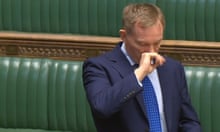A Conservative minister has scuppered the progress of a new law to pardon all gay and bisexual men in England and Wales historically convicted of sexual offences that are no longer criminal.
The legislation, put forward by John Nicolson of the SNP, failed to pass to its next stage in the House of Commons after an emotional debate that brought former Labour minister Chris Bryant close to tears.
Nicolson’s bill would have given an automatic pardon to men convicted under the obsolete laws relating to gross indecency with other men. It would go further than an amendment to the policing and crime bill proposed by the government, which only pardons the thousands of men who are already dead, while the living will have to apply to the Home Office to get their convictions overturned.
However, Sam Gyimah, a justice minister, ensured the bill could not go forward on Friday because he spoke for so long that it ran out of time. He argued that the bill did not give strong enough protections against men being accidentally pardoned for sex with a minor or non-consensual sex.
An attempt by the SNP to force a vote was unsuccessful because there were not the requisite 100 MPs in the House of Commons. Debate on the bill is set to resume on 16 December but it is unlikely to progress without the support of the government.
Ministers announced earlier this week that about 40,000 dead people will be pardoned, three years after a posthumous pardon was issued to the second world war codebreaker Alan Turing for the offence of gross indecency.
But out of the 65,000 men convicted under the abolished laws, about 15,000 are still alive and will have to go through an administrative process in order to obtain a pardon.
Bryant, the former shadow leader of the House of Commons, fought back tears in parliament as he said it was not good enough for the government to automatically pardon those who are deceased while requiring the living to apply to the Home Office.
“Why on earth would you want to write to the home secretary and say, ‘Please can I be pardoned’?” he asked. “Why on earth would you want to go through a process all over again? Why on earth would you want someone to analyse whether or not you were guilty at all way back when?”
Speaking in parliament, Bryant recalled a group of gay and bisexual MPs who opposed the appeasement of Adolf Hitler in the 1930s, but were bullied by the government of the day and branded the “glamour boys”. He said they and others should receive “something that feels like an apology”.
Crispin Blunt, the Conservative former justice minister, also warned that the government’s proposals do not have the desired “symbolic effect”, while Nigel Adams, another Tory MP, labelled the behaviour of ministers as “a little bit slippery”.
Wes Streeting, a Labour MP, shouted “outrageous” as Gyimah made his arguments and later tweeted that the minister had “come to work to block a bill to deliver justice for people imprisoned and chemically castrated for being gay – what a guy”.
Nicolson said his bill would “provide a blanket pardon for any gay man convicted of a crime which is no longer a crime”.
“The meaning of that is patently obvious,” he said. “If the crime for which you were convicted is still a crime, by definition you are not pardoned,” he said. “So let nobody be confused about that. The aim of this simple measure is, I hope, obvious.
“The pardon confers no immediate advantage except this: it will, I hope, bring closure to those men who have had those monstrous, unfair criminal convictions for decades.”
But Gyimah, a government minister, said: “As well as honouring the dead, [the Nicolson bill] seeks a pardon for the living. We have developed a way to do this without giving any perception that the pardon covers perpetrators of sex with a minor or non-consensual sex.
“What I would like to do today [Friday] is to make a full and open offer to the honourable member to work with officials in the Ministry of Justice and the Home Office and [the gay rights group] Stonewall to give real effect to this pardon for the dead and the living as fairly and quickly as possible.”







